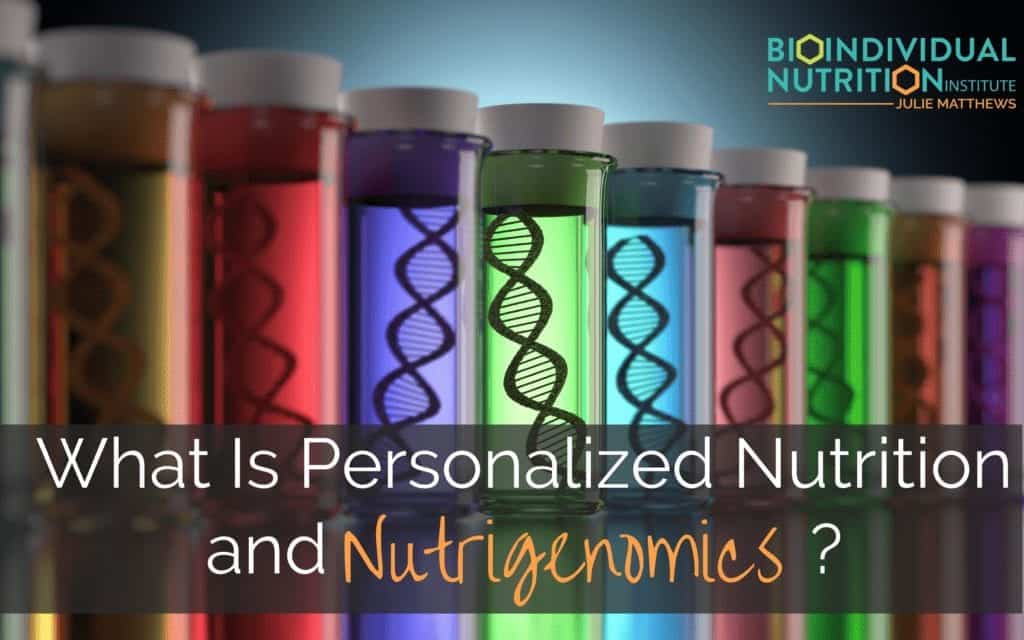Nutritional genomics is a vital component of personalized nutrition, and valuable to understand for the greatest success in your nutrition practice.
Nutritional genomics is a term that encompasses the interaction of genes and nutrients, and how this affects individual characteristics and disease risk (i.e. their phenotype). Nutritional genomics encompasses nutrigenetics and nutrigenomics.
Nutrigenetics is the study of how our genes affect the foods we tolerate and nutrients we need (and our disease risk).
Nutrigenomics is the study of how food impacts our gene expression.
One of the most significant advantages of studying nutritional genomics is the practical application of improving people’s health through personalized nutrition.
Genetic testing continues to expand our view on how food molecules impact human cells. Research continues to uncover why some individuals respond differently to the same type of foods, supplements, and beverages. However, to most health professionals it’s still not clear what people should eat to optimize their health and performance. This is because, currently, most diet recommendations are based on a one-size-fits-all model, which was created decades ago.
How Genes Impact Nutrition
Each individual is born with numerous variations within their DNA, known as “single nucleotide polymorphisms” (SNPs). With SNPs, most of the enzymes do not function at peak capacity, making it possible to increase this activity by using the right phytochemical.
Nutrigenetics makes it possible for healthcare professionals to create personalized nutrition recommendations based on an individual’s genetic profile. These individuals can optimize their health by eating a proper diet that best matches their genetics and lifestyle.
Personalized Nutrition, or BioIndividual Nutrition®, is the link between our genes and lifestyle/environment.
Personalized nutrition can target these specific SNPs, as this is much more effective than following general dietary guidelines. And our genes can help us determine which foods we might not tolerate, such as gluten.
Evolution of Nutrigenetic Testing
Nutrigenetic testing continues to evolve, as now tests can focus on different well-being or health issues. But genetic testing is not the full picture. There are other factors, such as whether a gene is expressed or not, which is not determined by testing. There is also a complex interplay among genes, and the recommendations are only as good as the research and intelligence behind the algorithms.
Genetic testing is one way we can personalize nutrition, but additional factors need to be considered. At the BioIndividual Nutrition Institute we train practitioners to consider: symptoms, health conditions, food reactions and dietary consumption, the microbiome, mitochondrial and metabolic function, nutrient deficiencies, genetic testing, and more.
Additional research is needed to understand complex gene-diet interactions better, as nutrigenetics offers plenty of potential for individuals looking to improve their health by following a personalized nutrition plan.
Individual Nutrition Counseling
Following individual nutrition counseling can play an important role in improving your health, as no two individuals are the same. For example, one in three people has a poor response to sugar. Teaching these individuals how to avoid these spikes in blood glucose can dramatically reduce their chance of developing diabetes.
Today’s standard nutrition guidelines are developed from questionnaires about the type of food people ate in the last year. However, this approach is flawed because many respondents are poor at trying to recall their food choices, and the average of all this data doesn’t offer any personalized guidance.
Individual Responses to Food
Trying to determine how genes affect obesity remains a challenge, as various studies show that this number ranges from 35 to 85 percent. [1] Following the same diet can impact people in different ways, as a recent study focused on how participants processed the same type of food, which included identical twins. The study, called the PREDICT1 study, showed how a person metabolizing one macronutrient isn’t a predictor of how that individual will respond to other macronutrients.[2] Additional studies are needed to better determine the ideal diet for an individual.
Why Genes Play a Limited Role in Processing Fats and Carbohydrates
The PREDICT study also focused on the variety of gut microbes while analyzing their responses to different diets. The study included 300 British volunteers, 100 individuals from the United States, and 700 identical twins. Data was gathered for anything impacting the metabolism, such as exercise, body fat composition, sleep duration, and microbiota. The initial results focused on the insulin, glucose, and triglyceride levels of the participants after eating a standard meal.
The team found that genes only play a limited role in the processing of fats and carbs. For example, only half of the post-meal glucose levels and less than 30 percent of the triglyceride and insulin response could be connected to genetic influence among identical twins. More important factors in how the body metabolizes food seem to be sleep, exercise, stress levels, and the diversity of the gut microbiome.
Closing Thoughts
Following a personalized nutrition plan can make a big difference in helping people to live healthier lives. Nutrigenetics helps you make the best recommendations for the individual based on their genes. And nutrigenomics makes it possible to recommend the best dietary choices to positively influence how your genes express. Understanding bioindividual factors affecting your client or patient’s symptoms and condition such as food reactions, the microbiome, mitochondrial and metabolic function, and nutrient deficiencies can help you determine the best personalized diet and nutrition plan to improve the health of the individual.




